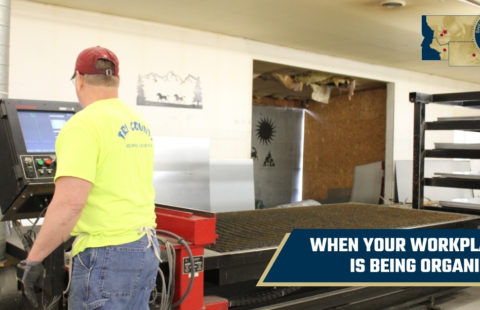Blog
- Home
- Organizing
- Things Your Employer Cannot Do!

Things Your Employer Cannot Do!
Remember… You Have Rights
Any of the acts listed in this article constitutes a violation. If your employer does any of these things, make a note of it, including names of those involved, time, place, etc. AND REPORT SUCH INCIDENTS TO YOUR UNION.
Here’s The Law | Your Protection
“Section 8(a) It shall be unfair labor practice for an employer–(1) to interfere with, restrain or coerce employees in the exercise of the rights guaranteed in Section 7: (2) by discrimination in regard to hire or tenure of employment to encourage or discourage membership in any labor organization… .”
What Does This Mean?
It means that employees are supposed to have a FREE CHOICE in deciding whether or not they want to exercise their right to organize. Anything that an employer does to interfere with this free choice is against the law. An employer is not supposed to question employees, or even to find out, about how employees feel, who signed cards, which employees are pushing the union, who attended meetings, what went on at meetings, etc. It is none of their business. It means that an employer is not supposed to make any promises of raises, promotions or other benefits in order to influence employees in the exercising of their rights. It means that an employer cannot take away, or threaten to take away, any benefits which you already have because of your union activity.
It means that it is illegal for an employer to penalize an employee in any manner because of his/her union activity or belief. This includes such things as cutting out overtime, transferring to a less desirable job, suspension or discharge. (If an employer does any of these things, and it is proven that it was done because of union activity they must reinstate the employee to his/her former position without loss of seniority and pay him/her for all lost wages.)

It is unlawful for your employer, supervisor or foreman to interfere with, restrain or coerce employees seeking to organize or join a union.
- Engage in open or undercover surveillance of employees’ union organizing activities, or give the impression that the employees are under surveillance (such as by sending supervisors to spy on union meetings, watching the union hall, encouraging other employees to engage in surveillance);
- Tell employees that the company will fire or punish them if they engage in union activity;
- Lay off, discharge, discipline any employee for union activity;
- Grant employees wage increases, special concessions or benefits in order to keep the union out;
- Bar employees serving as union representatives from soliciting employees for membership on or off the company property during non-working hours;
- Ask employees about union matters, meetings, etc. (Some employees may, of their own accord, discuss such matters. It is not an unfair labor practice to listen, but to ask questions to obtain additional information is illegal);
- Ask employees what they think about the union or a union representative;
- Ask employees how they intend to vote;
- Threaten employees with reprisal for participating in union activities. For example, threaten to move the plant or close the business, curtail operation or reduce employee benefits;
- Promise benefits to employees if they reject the union;
- Form a “company union,” dominate, or give financial support or other assistance to a union;
- Announce that the company will not negotiate with the union;
- Threaten to close, in fact close, or move the business in order to avoid dealing with a union;
- Ask employees whether or not they belong to a union, or have signed a card or petition for union representation;
- Ask an applicant, during the hiring interview, about his/her affiliation with a labor organization or how he/she feels about unions;
- Make anti-union statements or act in a way that might show a preference for a non-union worker;
- Make distinctions between union and non-union employees when assigning overtime work or desirable work;
- Purposely team up non-union workers and keep them apart from those supporting the union;
- Transfer workers on the basis of union affiliation or activities;
- Choose employees to be laid off in order to weaken the union’s strength or discourage membership in the union;
- Discriminate against union people when disciplining employees;
- By nature of work assignments, create conditions intended to get rid of an employee because of his/her union activity;
- Fail to grant a scheduled benefit or wage increase because of union activity;
- Deviate from company policy for the purpose of getting rid of a union supporter;
- Take action that adversely affects an employees’ job or pay because of union activity;
- Threaten workers or coerce them in an attempt to influence their vote;
- Threaten a union member or union supporter through a third party;
- Promise employees a reward if the business is not unionized;
- Tell employees overtime work and premium pay will be discontinued if the business is unionized;
- Say unionization will force the company to lay off employees;
- Say unionization will do away with vacations, or other benefits and privileges presently in effect;
- Promise employees promotions raises, or other benefits if they get out of the union or refrain from joining the union;
- Start a petition or circular against the union. Encourage or take part in its circulation if started by employees;
- Urge employees to try to induce others to oppose the union or stay out of it;
- Visit the homes of the employees to urge them to reject the union.



